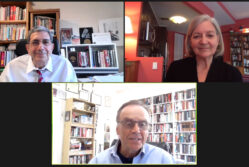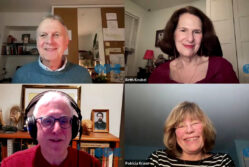
Meet the Winners: Adriana Gomez Licon Video Chat on Safety for Journalists
Sometimes, it’s better to wait for trouble to simmer down before rushing in to cover a story. “Don’t get killed for color,” a fellow reporter once told Adriana Gomez Licon. A city near Mexico’s northern border with Texas had been evacuated after a spate of drug violence. About 300 refugees fled to a shelter.
Gomez Licon was itching to cover the aftermath, but Dudley Althaus, a friend who worked for The Houston Chronicle, recommended talking to refugees before venturing into the city. “Who is going to talk to you, the bullets?”
That was just one of many safety tips Gomez Licon shared during a live OPC video chat on Wednesday, July 16. During the Q&A session, the Mexico-based Associated Press reporter covered how to report safely and protect sources when investigating hostile groups.
She won OPC’s 2013 Madeline Dane Ross award for her story, “Death of a Beauty Queen,” in which she investigated the death of a young woman killed in a gun battle between drug cartels and the Mexican army. Her reporting took her deep into the state of Sinaloa, a violent center of the country’s drug industry.
Gomez Licon used social media to gather information and develop a network of sources before going to the area, and took digital security precautions while reporting on the ground. She shared some of her best common-sense advice for correspondents operating in dangerous places.
Gather information about your destination before you go, and familiarize yourself with local media. An extra word of caution: in Mexico, some local journalists report information to drug cartels.
Always have an exit strategy. Know how to get to the closest airport, and study the main thoroughfares in and out of town. Identify two or three alternative routes.
Travel in groups. Plan your reporting with other journalists or a fixer, and tell your plans to trusted allies.
Be a moving target. Change your location frequently, and don’t spend too much time in one place.
Use social media sparingly, or not at all. Keep your Facebook settings private, and disable geolocation on apps such as Twitter and Instagram. Incautious posting could put sources at risk. But keep GPS features turned on for private apps like Find Friends, which can help editors or police track you down if you drop out of contact.
Each story requires different precautions, she said. In some cases, she wears physical protection.
“I was just covering World Cup protests in Brazil, São Paulo. I had to always be wearing a helmet and carry a gas mask in case there was a clash with police,” she said. But when talking to family members of her subject in Sinaloa, she felt body armor would send the wrong message.
“While interviewing the mourning mom of my subject, I’m not going to wear a bulletproof vest, because I don’t think it would be sensitive.”
Gomez Licon also addressed the particular dangers of reporting as a woman. She said she remains vigilant of her surroundings, and on guard when approaching groups of men. But mostly, she hasn’t found gender to be a barrier to her reporting, and in the Sinaloa it might have helped her to gain trust from sources close to the subject of her piece.
“In this kind of story I think it helped me that I was a young woman, that I could sort of relate to the lives of these young women,” she said. “I found that the mother sort had a motherly attitude toward me, and I think that helped her to really get into how she felt.”
Read her story here.
Gomez Licon’s video chat with OPC marks the second of the our “Meet the Winners” events with award winners.
Watch the whole conversation here:



